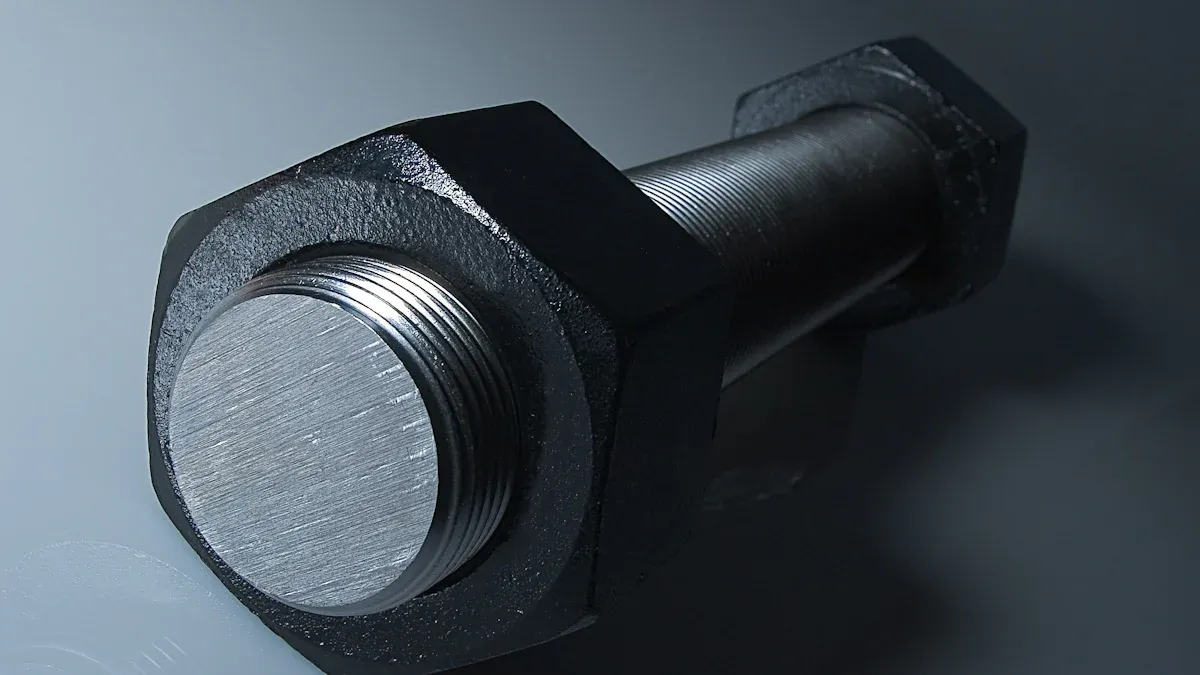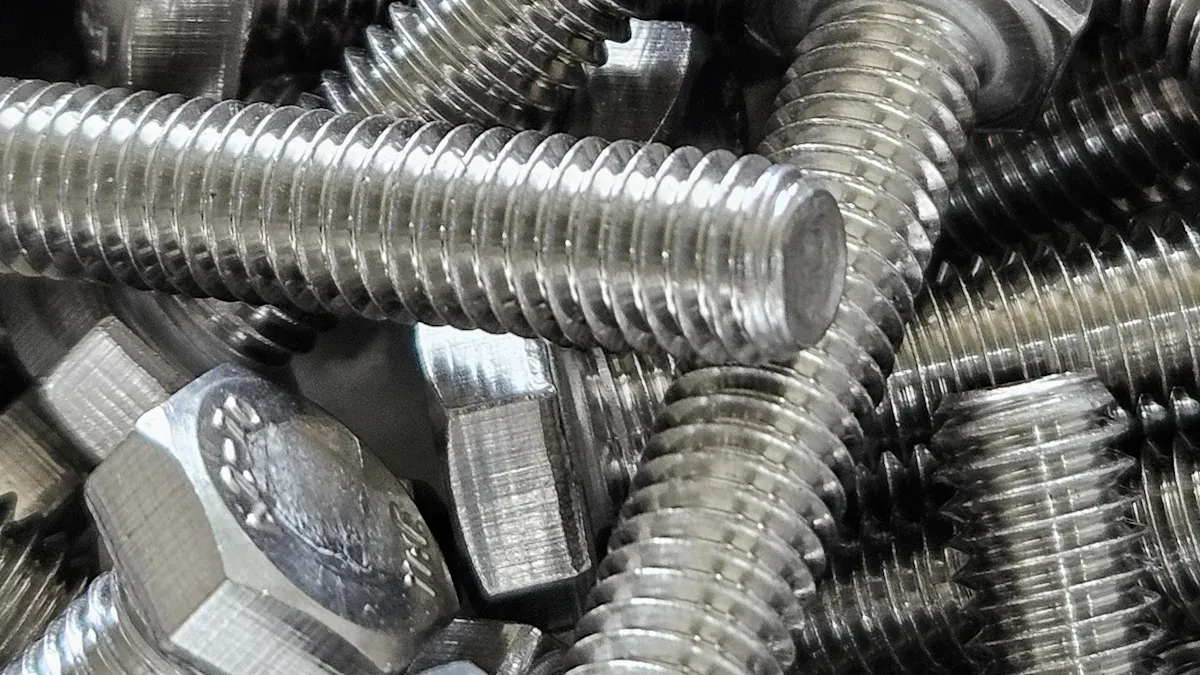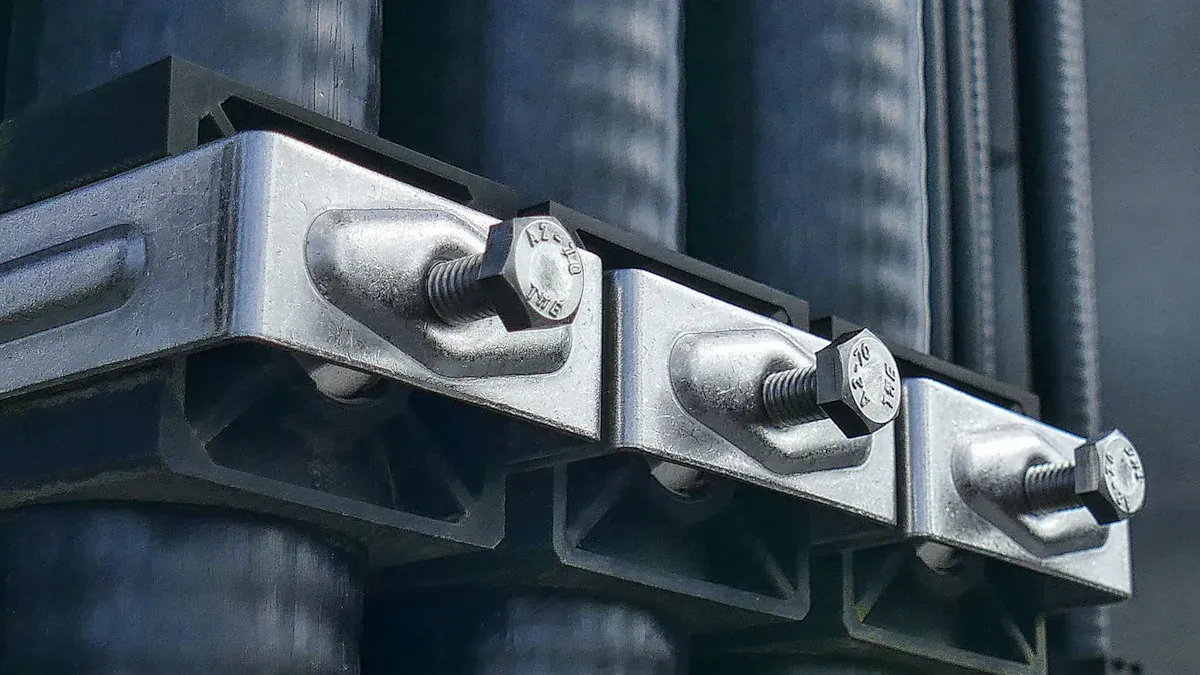
Hexagonal fasteners play a pivotal role in heavy machinery, ensuring structural stability and operational safety. Industries like construction and automotive depend heavily on these components.
- In 2022, hexagon flange bolts fulfilled 40% of construction industry needs, critical for machinery integrity.
- The automotive sector also utilized 40% of global demand, prioritizing safety and performance.
- Mining and agriculture rely on these fasteners to maintain equipment efficiency in extreme environments.
Compliance with standards like ISO 898-1 and ASTM F606 guarantees the load-bearing capacity of fasteners, ensuring they withstand immense stress. Hex bolt and nut, plow bolt and nut, track bolt and nut, and segment bolt and nut are indispensable in this context, offering durability and reliability under high-stress conditions.
Key Takeaways
- Hexagonal fasteners are important for heavy machines. They keep structures stable and safe in industries like building and cars.
- Following rules like ISO and ASTM makes fasteners strong. This helps them work well under heavy pressure.
- Checking and oiling fasteners often is very important. It helps hex bolts and nuts last longer and work better.
Overview of Hex Bolt and Nut in Heavy Machinery

Definition and Features of Hex Bolt and Nut
Hex bolts and nuts are essential fasteners characterized by their hexagonal-shaped heads and threaded shafts. These components are designed for use with unthreaded objects, secured by a nut to create a robust assembly. Hex bolts offer superior torque application due to their six-sided head, enabling efficient tightening and loosening. Their design ensures high clamping force, which is critical for maintaining compression under load.
Technical specifications such as ASTM A193 and ASTM A194 define the material properties and performance standards for hex bolts and nuts. For instance, ASTM A193 covers alloy steel and stainless steel bolting materials for high-temperature or high-pressure applications, while ASTM A194 focuses on nuts for similar conditions. These standards ensure durability and compatibility with heavy machinery components.
Common Applications in Heavy Machinery
Hex bolts and nuts are widely used across industries due to their versatility and reliability. In construction machinery, they secure structural components, ensuring stability under dynamic loads. Mining equipment relies on these fasteners to withstand harsh environments and heavy vibrations. In the automotive sector, hex bolts and nuts play a crucial role in assembling critical parts, including wheel systems and engine mounts.
The global market for these fasteners continues to grow, driven by increased production in the automotive industry, particularly for electric and hybrid vehicles. Their application extends to oilfield, farm, and garden machinery, highlighting their importance in diverse sectors.
Benefits of Using Hex Bolt and Nut in High-Stress Environments
Hex bolts and nuts excel in high-stress environments due to their high tensile strength and load-bearing capacity. For example, bolts with a diameter of 1/2 inch are ideal for heavy-duty applications, offering exceptional strength and reliability. Larger diameters, such as 5/8 inch, are preferred for structural applications in construction and mining, where durability is paramount.
These fasteners provide more holding power compared to screws, making them indispensable for heavy-duty machinery. Their ability to maintain compression under load ensures operational safety and efficiency, even in extreme conditions. Compliance with ASTM standards, such as ASTM F568, further enhances their reliability, making them a preferred choice for critical applications.
Ningbo Digtech (YH) Machinery Co.,Ltd. specializes in manufacturing high-quality hex bolts and nuts, ensuring adherence to industry standards and delivering products that meet the demands of heavy machinery applications.
Standards Governing Hex Bolt and Nut
International Standards (e.g., ISO, ASTM, ASME B18)
International standards ensure the quality, safety, and reliability of hex bolts and nuts used in heavy machinery. Organizations like ISO, ASTM, and ASME provide comprehensive guidelines for material properties, dimensional accuracy, and performance metrics.
ISO 9001:2015 certification guarantees compliance with global quality management standards, ensuring that stud bolts and heavy hex nuts meet stringent requirements. ASTM standards, such as ASTM A193 and ASTM A194, define the mechanical properties of alloy and stainless steel fasteners, making them suitable for high-pressure and high-temperature applications. ASME B18.31.1M specifies dimensional requirements for metric fasteners, ensuring compatibility with ISO metric screw threads.
| Type of Fastener | Standard | Measurement System |
|---|---|---|
| Round Head Bolts | ANSI/ASME B18.5 | Inch Series |
| Hex Head Bolts | DIN 931 | Metric |
| Hex Head Bolts with Nuts | ISO 4016 | Metric |
These standards provide a unified framework for manufacturers and users, ensuring that hex bolts and nuts perform reliably across diverse industries. Ningbo Digtech (YH) Machinery Co.,Ltd. adheres to these international standards, delivering products that meet the highest benchmarks for quality and performance.
Industry-Specific Guidelines for Heavy Machinery
Heavy machinery applications demand specialized guidelines to address unique operational challenges. Industry-specific standards focus on factors like load-bearing capacity, corrosion resistance, and environmental suitability. For example, mining equipment requires bolts with enhanced durability to withstand vibrations and harsh conditions, while construction machinery relies on fasteners with high tensile strength for structural stability.
Safety records in heavy machinery highlight the importance of adherence to these guidelines. Regular practices such as inspection, cleaning, lubrication, and proper storage ensure the longevity and reliability of hex bolts and nuts.
| Maintenance Practice | Description |
|---|---|
| Inspection | Regular checks for wear, corrosion, or damage to ensure integrity and performance. |
| Cleaning | Keeping bolts clean to prevent corrosion and ensure long-term performance. |
| Lubrication | Applying lubricants to reduce friction and prevent seizing, especially in harsh environments. |
| Tightening and Loosening | Following torque specifications to avoid over-tightening or under-tightening, which can lead to failure. |
| Storage | Storing bolts in a dry, clean environment to prevent corrosion and degradation. |
| Replacement | Replacing compromised bolts to prevent failures and safety hazards. |
| Environmental Considerations | Choosing appropriate materials for harsh environments to ensure reliability. |
| Documentation | Maintaining records of inspections and maintenance to ensure compliance with industry standards. |
By following these guidelines, companies can minimize risks, enhance operational efficiency, and maintain compliance with regulatory requirements.
Importance of Compliance with Standards for Safety and Performance
Compliance with standards directly impacts safety and performance in heavy machinery applications. High compliance rates correlate with improved worker safety and operational efficiency. Metrics like Total Recordable Incident Rate (TRIR) and Days Away, Restricted, or Transferred (DART) Rate improve significantly when companies adhere to industry standards.
- High compliance rates reduce risks and prevent regulatory penalties.
- AI-powered analytics help companies identify problem areas, lowering TRIR and DART rates.
- Increased near-miss reporting enhances proactive hazard identification, improving overall safety metrics.
Regular equipment maintenance, supported by compliance, ensures machines operate efficiently and safely. Companies that prioritize adherence to standards benefit from reduced downtime, fewer accidents, and optimized performance. Ningbo Digtech (YH) Machinery Co.,Ltd. exemplifies this commitment by delivering hex bolts and nuts that meet stringent industry requirements, ensuring reliability in high-stress environments.
Load-Bearing Capacity of Hex Bolt and Nut

Factors Influencing Load-Bearing Capacity
The load-bearing capacity of hex bolts and nuts depends on several critical factors. These include material properties, thread design, bolt size, and environmental conditions. Mechanical simulations, such as finite element analysis (FEA), reveal how stress distributes across a bolt under varying loads. Tensile tests measure the maximum force a bolt can endure before breaking, while shear tests determine its resistance to forces acting parallel to its axis.
| Test Type | Description |
|---|---|
| Mechanical Simulation | Finite element analysis (FEA) simulates stress distribution under different loads. |
| Tensile Test | Measures tensile strength and yield strength by stretching the screw. |
| Shear Test | Determines shear strength using specialized equipment. |
| Fatigue Test | Assesses fatigue resistance under cyclic loads, including rotational bending and tension-compression. |
| Torque Test | Evaluates torque strength to ensure load-bearing capacity during tightening. |
Field data also highlights the importance of preload retention. For instance, jack bolt nuts outperform heavy hex nuts under dynamic loading conditions. At a preload of 5,000 lb, jack bolt nuts maintained their position, while heavy hex nuts loosened. This demonstrates the superior resistance of jack bolt nuts to transverse forces, making them ideal for high-stress applications.
Role of Material Strength and Thread Design
Material strength and thread design significantly impact the performance of hex bolts and nuts. High-strength materials, such as alloy steel, enhance the bolt’s ability to withstand extreme loads. Studies on high-strength bolts and bolted joints emphasize the importance of material properties in achieving optimal load-bearing performance.
Thread design also plays a pivotal role. Laboratory tests comparing different thread types reveal that threaded specimens exhibit higher flexibility up to 55 kN. However, beyond this point, their behavior changes, with reduced stiffness compared to full shank specimens. Half-threaded specimens, while initially less rigid, demonstrate increased stiffness near ultimate loads. These findings highlight the need for precise thread design to balance flexibility and strength in heavy machinery applications.
| Thread Design Type | Load-Bearing Capacity Behavior | Key Findings |
|---|---|---|
| Threaded Specimens | Higher flexibility up to 55 kN, then opposite behavior observed. | Thread intrusion significantly reduced node overlap. |
| Half-Threaded Specimens | Lower initial rigidity compared to shank bolts due to thread intrusion. | Increased stiffness near ultimate loads despite lower initial rigidity. |
| Full Shank Specimens | Higher stiffness predicted in models not considering threads. | Experimental data showed lower stiffness than numerical predictions when threads were included. |
Impact of Size and Dimensions on Load-Bearing Capacity
The size and dimensions of hex bolts and nuts directly influence their load-bearing capacity. Larger bolts, with increased diameters, provide a thicker compressive stress zone, enhancing their ability to handle heavy loads. However, the effect diminishes beyond a certain size, emphasizing the importance of selecting the right dimensions for specific applications.
Heavy hex bolts, with their larger and thicker heads, offer superior strength compared to standard hex bolts. The increased head size distributes loads more effectively, reducing the risk of deformation under high-stress conditions. Field tests document the following key performance metrics for bolts of varying sizes:
- Tensile Strength: 60,000 psi minimum.
- Hardness: Bolts shorter than three times their nominal diameter range from Rockwell B69 to B100. Longer bolts have a maximum hardness of Rockwell B100.
- Elongation: 18% minimum across all diameters.
- Proof Load: Coarse-threaded bolts withstand up to 100,000 psi, while fine-threaded bolts handle 90,000 psi. Additional proof loads reach up to 175,000 psi.
| Feature | Hex Head Bolts | Stud Bolts |
|---|---|---|
| Design | Hexagonal head for efficient torque application, but head-shank junction can be a stress concentration point. | Dual-threaded design with no head, providing even load distribution and eliminating stress concentration points. |
| Strength Characteristics | Good shear resistance due to head design, but susceptible to failure under high loads or vibration due to stress concentration. | Superior strength and durability due to even load distribution and absence of head-shank junction. |
| Overall Strength | Moderate to high strength, depending on material and manufacturing process. | High strength and durability due to design and manufacturing advantages. |
Ningbo Digtech (YH) Machinery Co.,Ltd. manufactures hex bolts and nuts with precise dimensions and high-grade materials, ensuring optimal load-bearing capacity for heavy machinery applications.
Hex bolts and nuts are indispensable in heavy machinery, ensuring safety and operational efficiency. Standards and load-bearing capacity play a vital role in their performance. Proper selection and compliance with industry guidelines optimize reliability. Ningbo Digtech (YH) Machinery Co.,Ltd. delivers high-quality hexagonal fasteners, meeting stringent standards for demanding applications.
FAQ
What are the key advantages of hexagonal fasteners in heavy machinery?
Hexagonal fasteners provide superior torque application, high tensile strength, and excellent load distribution. Their design ensures reliability and durability in high-stress environments.
Tip: Always select fasteners compliant with ISO or ASTM standards for optimal performance.
How does material choice affect the performance of hex bolts and nuts?
Material choice directly impacts tensile strength, corrosion resistance, and load-bearing capacity. High-strength alloys or stainless steel enhance durability in extreme conditions.
Why is compliance with international standards essential for hexagonal fasteners?
Compliance ensures safety, reliability, and compatibility with heavy machinery. Standards like ISO 898-1 and ASTM A193 guarantee consistent quality and performance across applications.
Note: Ningbo Digtech (YH) Machinery Co.,Ltd. manufactures fasteners adhering to these stringent standards.
Post time: May-03-2025